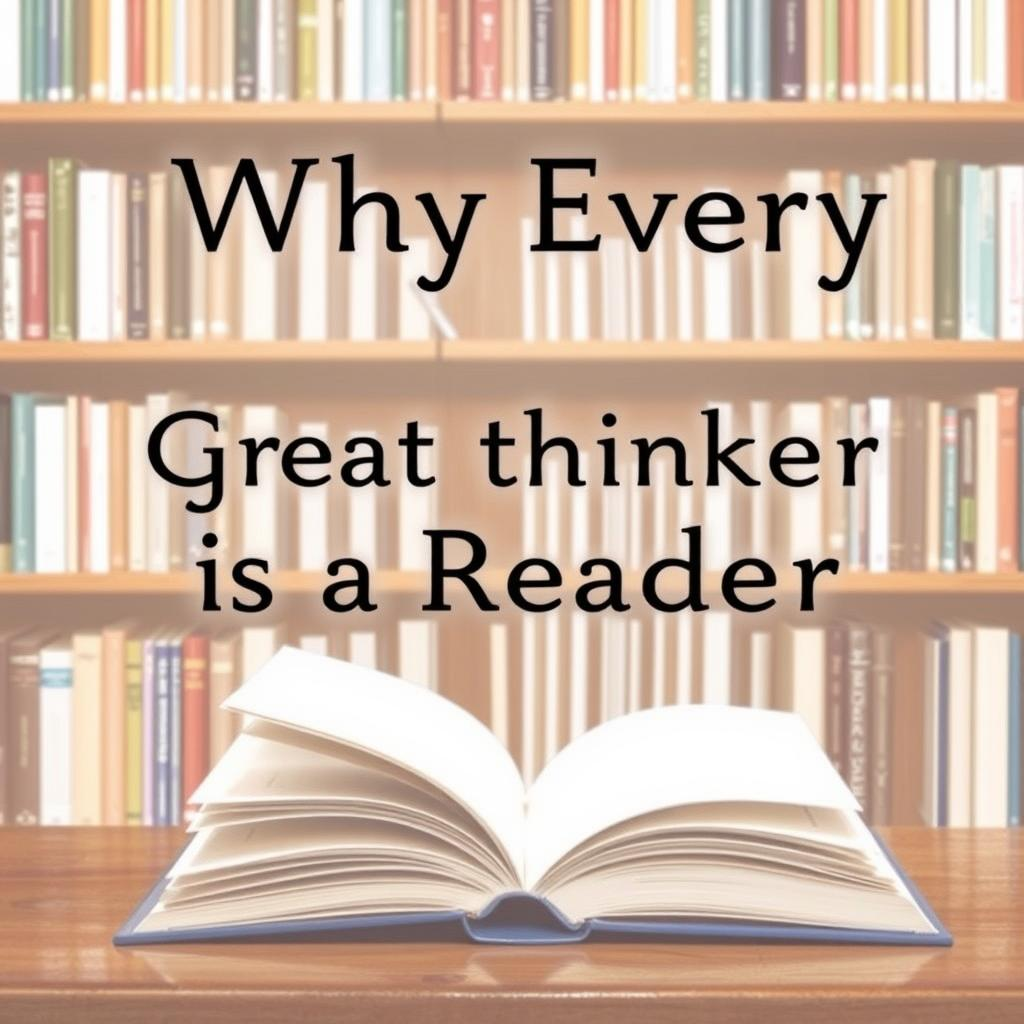
Why Every Great Thinker Is a Reader First
Behind every great idea, invention, or revolution lies a quiet habit: reading. From ancient philosophers like Aristotle and Confucius to modern-day innovators like Elon Musk and Oprah Winfrey, one trait ties them all together—an insatiable appetite for reading. This might seem like a simple pastime, but it’s anything but. Reading is the foundation upon which great thinkers build their ideas, refine their perspectives, and ultimately change the world.
So, why is it that every great thinker is a reader first? What is it about reading that primes the mind for greatness?
Let’s dig into the quiet power of the written word and how it shapes extraordinary minds.
Reading Fuels Curiosity
At the heart of every great thinker is curiosity—a relentless need to understand the world and everything in it. Reading fans the flames of that curiosity. Whether it’s diving into a dense philosophy text, exploring new scientific theories, or even reading fiction that transports them to different worlds, thinkers use books to feed their endless questions.
Books don’t just provide answers—they spark new questions. A single paragraph can ignite a lifelong passion, shift a worldview, or open the door to unexplored territory. Great thinkers read not because they have to, but because they want to keep discovering. The more they read, the more they realize how much they don’t know—and that humility is fertile ground for innovation.
Reading Builds a Mental Archive
Thinkers don’t operate in a vacuum. Every profound idea is often a remix of many smaller ones—collected, connected, and reimagined. When you read, you’re essentially building a mental archive: a library of insights, stories, data, and philosophies that can be drawn upon at any time.
Great thinkers often credit their ability to solve problems to the sheer volume of information they’ve absorbed through reading. Steve Jobs famously said, “Creativity is just connecting things.” And to connect ideas meaningfully, you need a deep well of knowledge to draw from. Reading provides that well.
In many ways, a reader is like a mental time traveler—learning from the failures and triumphs of people across centuries and cultures. This broad perspective gives great thinkers the ability to see patterns others miss and make connections others never consider.
Reading Develops Empathy and Perspective
While intelligence and logic are essential to great thinking, so is empathy—the ability to see things from another person’s point of view. Reading, especially fiction and biographies, allows thinkers to step into someone else’s shoes, to understand human experiences far removed from their own.
This deepened empathy is what gives thinkers the ability to lead, inspire, and create change. Nelson Mandela once said, “A good head and a good heart are always a formidable combination.” Reading cultivates both.
Moreover, exposure to diverse viewpoints challenges the thinker’s own assumptions. It teaches humility—the realization that your perspective is not the only one. And it sharpens critical thinking by forcing the reader to analyze, evaluate, and sometimes even reject what they read.
Reading Is Thinking in Dialogue
Writing is a one-way conversation—but reading is a dialogue. When great thinkers read, they don’t passively consume the material. They interrogate it, argue with it, take notes in the margins, and wrestle with ideas. In this way, reading becomes a form of active thinking.
Socrates was skeptical of the written word because he feared it would stop people from thinking for themselves. Ironically, the opposite has become true for many readers. Books have become springboards for independent thought.
The best books are like sparring partners. They challenge you, push you, frustrate you—and make your mind stronger in the process. Thinkers who read often are in constant mental conversation with the authors they admire (and sometimes the ones they don’t).
Reading Cultivates Discipline and Focus
In a world increasingly distracted by rapid-fire information and endless notifications, reading remains one of the few deep, immersive experiences we can have. It demands focus. It trains the mind to sustain attention—something every great thinker needs.
Reading a book, especially a complex one, is a slow process. It requires discipline, patience, and perseverance. These are the same traits required to pursue difficult questions, develop new theories, or build something truly original. Great thinkers are not just brilliant—they are persistent. Reading helps build that mental endurance.
Reading Inspires Action
Reading doesn’t just fill minds—it fuels movements. From Karl Marx’s The Communist Manifesto to Rachel Carson’s Silent Spring, books have lit the spark for revolutions, redefined public policy, and reshaped society. Great thinkers don’t just read to accumulate knowledge—they read to act on it.
Martin Luther King Jr. was deeply influenced by Thoreau’s Civil Disobedience and Gandhi’s writings. These books didn’t just inform his beliefs—they inspired his actions. Reading can be a radical act. It empowers thinkers to imagine a better world and then work to create it.
The Habit of Lifelong Learning
Ultimately, what separates great thinkers from everyone else is not just talent—it’s the habit of continuous learning. And reading is the most accessible, reliable, and transformative tool for learning available to us.
Thinkers like Warren Buffett still spend hours a day reading. Bill Gates goes on “reading vacations.” These aren’t just hobbies—they’re habits of greatness. The willingness to read, to learn, and to grow is what keeps thinkers sharp well into their later years.
Reading is not something they do until they become successful—it’s something they do because they want to stay successful.
Conclusion: The Reader Behind the Genius
Great thinkers are often remembered for their speeches, their inventions, or their breakthroughs. But behind all of that is a quieter, less glamorous image: a person sitting alone with a book. Reading isn’t always dramatic, but it’s deeply transformative.
So if you’re looking to sharpen your mind, expand your worldview, or spark your next big idea—start by reading. Read widely. Read deeply. Read things that challenge you. Because the truth is, every great thinker was a reader first.
And if you want to think like the best? Crack open a book.
